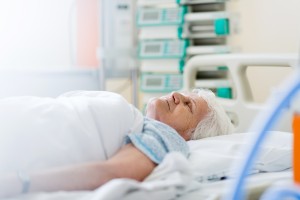
Nursing home residents have the right to be treated with respect and free from any form of nursing home abuse, which could include the use of restraints. Sometimes these facilities use restraints to keep residents from harming themselves or to make their jobs easier. In any case, the overuse of restraints on residents, generally without consent, is abusive.
Our legal team further explains the types of restraints used in nursing homes and the types of injuries they may cause. If you suspect nursing home abuse, you may be eligible to take legal action. Our initial consultation is confidential and completely free.
Types of Restraints Used on Residents
There are two types of restraints that a nursing home may use on a resident to restrict movement: Physical and chemical restraints. Unfortunately, such restraints are often used by nursing home staff who are overworked, understaffed, or unwilling to use more effective safety measures to do their jobs. This is why both physical and chemical restraints could be considered a form of nursing home abuse.
Physical Restraints
Physical restraints include different devices, equipment and methods that are attached to a resident’s body to keep him or her in bed. These restraints are difficult to remove and can cause a resident to feel stressed, agitated and helpless. Some physical restrains could include:
- Ropes or soft ties
- Vests
- Hand mitts
- Arm restraints
- Leg restraints
- Tight sheets to prevent movement
- Bedrails or safety bars
- Lap trays and wheelchair belts
- Hook and loop fasteners on clothing
- Improvised restraints (belts or cords)
Nursing home staff may use other methods of restraints to restrict movement, such as pushing a wheelchair or bed close to the wall so that a resident is unable to back up or move. Residents who already have decreased mobility due to a disability or old age can be seriously harmed.
Chemical Restraints
Chemical restraints are the use of sedative drugs to subdue residents because nursing home staff do not want to have to deal with them. This also includes the overuse of:
- Anti-psychotic medications
- Anti-seizure drugs
- Other powerful psychotropic drugs
These facilities are not supposed to use drugs to treat residents unless prescribed by a doctor for medical reasons, such as for treatment related to a mental illness.
When Use of Restraints Are Not Allowed
State and federal laws prohibit the unnecessary use of using restraints and provide detailed circumstances when using restraints are unacceptable. Nursing home staff may not use restraints to:
- Punish or discipline a resident
- Make caring for a resident more convenient
- Permanently control a resident
- Substitute an activity or medical treatment
When a facility fails to follow the guidelines for using restraints, they are violating a resident’s rights. Our West Palm Beach nursing home abuse attorneys are well-versed in these laws and how they may apply to your situation. We are prepared to evaluate your claim in a free, no-obligation consultation.
Injuries Caused by Nursing Home Restraints
When residents are physically restrained, any injuries sustained are generally easier to identify. These injuries could include rope burns, sores, bruising on the ankles and wrists and an increased risk of infection. Since being strapped to a bed or chair restricts mobility, a resident could also suffer from muscle atrophy, a decrease in bone density, stiffness, incontinence, as well as constipation.
Residents who are physically restrained for long periods of time may even develop emotional and psychological trauma, such as anxiety and depression. Chemical restraints, on the other hand, are generally harder to detect but could potentially lead to serious injuries and death.
Nursing Home Restraints Under Florida Law
Florida law requires that the use of physical restraints must be authorized in writing by a doctor or another licensed medical professional as permitted by the state and the nursing home. This authorization must detail the amount of time physical restraints may be used.
In an emergency situation, only a qualified nurse would be able to use physical restraints on a resident without a doctor’s authorization. The use of physical restraints, however, must be noted in writing on the resident’s medical record.
The use of chemical restraints is also limited to prescribed doses of medications authorized by a doctor, physician assistant, or a licensed registered nurse. The treatment must be consistent with the resident’s diagnosis and the policies and procedures implemented by the nursing home.
Find Out If You Are Able to Take Legal Action
If your loved one has been harmed by physical or chemical restraints, contact Gordon & Partners to get started on your claim. We know how to hold nursing homes liable for abuse.
Reach out for a free consultation. You are not obligated after the meeting to hire our firm, but if you do, we charge nothing up front for our services. We only get paid if you are compensated.

 1-855-722-2552
1-855-722-2552